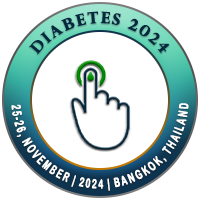
Salma Alkalbani
Family physician, OmanTitle: The association between alcohol intake and obesity in a sample of the Irish adult population
Abstract
Background: The prevalence of obesity is increasing worldwide. Alcohol has been studied as a possible risk factor for obesity, but the evidence is discordant. This study examined the association between alcohol consumption and obesity in an Irish population.
Method: A cross-sectional study using secondary data from the Healthy Ireland Survey 2017 was conducted. Descriptive and comparative data were analysed to identify associations of alcohol-related variables with waist circumference (WC) and body mass index (BMI). Regression analysis was performed to examine the associations between harmful alcohol consumption (AUDIT-C score? 5) and obesity indicators. Adjustments were made for sociodemographic variables, health-related variables, and other alcohol-related variables.
Result: A total of 7486 participants took part in this survey (response rate=60.4%). Most of the participants (86%) were alcohol drinkers, with the majority drinking less than 3 times per week (77.5%); 49.1% were considered harmful drinkers. After controlling for possible confounders, positive associations of harmful alcohol consumption with WC (?=1.978, 95% CI: 0.996, 2.960) and BMI (OR=1.247, 95% CI: 1.058, 1.471) were observed. Further controlling for alcohol consumption frequency and binge drinking made this association nonsignificant. Unlike less frequent binge drinking, frequent binge drinking was positively associated with WC.
Conclusion: Harmful alcohol consumption was associated with obesity (high BMI, large WC) after controlling for possible confounders; however, this association became nonsignificant after controlling for other alcohol-related variables. Frequent binge drinkers were more likely to have a large WC. Further longitudinal studies to examine the exact association between alcohol consumption and obesity are warranted.
Biography
To be added

